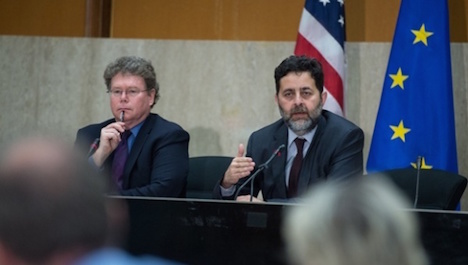EU to allow carcinogenic pesticides after US pressure
 Print This Print This
By Staff Writers, teleSUR
teleSUR
Saturday, May 23, 2015
 |
| Chief EU negotiator Ignacio Garcia-Bercero (R) and chief U.S. negotiator Dan Mullaney hold a press conference in Washington, D.C., after a new round of talks on creating a transatlantic free trade zone, May 19, 2015. | Photo: AFP
|
The European negotiators of the Transatlantic Trade and Investment Partnership (TTIP) allegedly buckled under the pressure of their U.S. counterparts and abandoned legislation restricting the use of various types of pesticides linked to cancer and other diseases, the Guardian reported Friday.
According to documents quoted by the British newspaper and obtained by Pesticides Action Network (PAN) Europe, the U.S. Mission to Europe and the American Chambers of Commerce solicited EU officials to abandon their intention of restricting the use of endocrine disrupting chemicals (EDCs) during a visit to Europe in July 2013.
Minutes of the meeting revealed that “although [EU officials] want the TTIP to be successful, they would not like to be seen as lowering the EU standards,” while the AmCham representatives” complained about the uselessness of creating categories and thus, lists” of prohibited substances. They suggested that instead of a preventive approach, the EU should embrace a risk-based approach and authorize the chemicals – then run impact-assessment studies.
On the same day, the EU officials ceded to the U.S. lobbying, as Secretary-General of the EU Commission Catherine Day ordered in a letter to the environment department’s director Karl Falkenberg to drop the legislation, planned for 2014.
Despite an estimation of US$165 billion in health costs to European countries from endocrine-related illnesses such as IQ loss, obesity and cryptorchidism – a condition affecting the genitals of baby boys [ed. note: undescended testicles - prh], the legislation was then postponed until at least 2016.
Green Member of Parliament Bas Eickhout told the Guardian these revelations were “incredible“.
“These documents offer convincing evidence that TTIP not only presents a danger for the future lowering of European standards, but that this is happening as we speak,” he said.
The TTIP has met strong public opposition so far, with critics saying it will increase corporate power and make it difficult for governments to regulate markets.
The U.S. Congress is close to approve a fast track bill so the administration would have free reign to to negotiate trade deals without any congressional input. Legislators from the opposition, however, have denounced the inclusion of a “Monsanto provision” allowing corporations to sue countries or states over laws that mandate the labelling of genetically modified foods as an example of what’s wrong with these free trade agreements like the TTIP and TTP.
In April, a senior UN official warned that secret negotiations on international trade deals were a threat to human rights by excluding key stakeholder groups from the process, including labor unions, environmental protection groups, food-safety movements and health professionals.
Source URL
|
 Print This Print This

|

